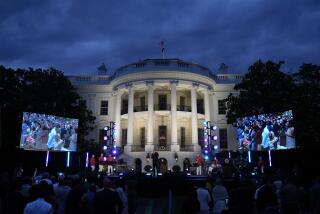Remembering D-Day
- Share via
Your D-day special edition (World Report, May 31) underscores the unlimited acts of courage and bravery demonstrated by American paratroopers, infantry, the Navy and so many other genuine heroes. I remember as a schoolboy on June 6 that we were directed to the assembly hall where we joined in a prayer delivered by President Roosevelt over the radio for the safety of our troops.
What remains most memorable about that day and during all of World War II was the fact that it was the last time the people of the United States were totally unified in purpose. Everyone seemed to focus on whatever had to be done to achieve victory. If even a small percentage of that spirit would be present today, there would be no problem facing us that could not be confronted and overcome.
SID SKOLNIK
West Hollywood
Alexander Cockburn (Column Left, June 3), provides a necessary antidote to overwhelming D-day hype by correctly and courageously reminding us of the largely symbolic importance of Operation Overlord in the annals of military history. The Soviet Union bore the brunt of fighting the Nazis in World War II. The commemorative spectacle in Normandy is made the more galling when one bears in mind U.S. sponsorship of Axis war criminals during the Cold War. D-day should be a time of remembrance for all who dedicated themselves to fighting fascism.
STEVEN KROLAK
Santa Barbara
Your articles and the television coverage (C-Span and other channels) are wonderful in their thorough presentation of the events of that memorable day in June, 1944.
Hovering in the background in the channel we see the battleships (the Arkansas) and cruisers firing their mighty guns to “soften up” the beachhead. And approaching the beaches we witness the incredibly brave drivers of the LSTs (landing ship tanks) and LCIs (landing craft infantry). And the soldiers, heroic beyond measure.
And yet, there are glaring omissions. Omissions of how the troops, their heavy weapons, the tanks, trucks, and Jeeps, the gasoline for those vehicles, the ammunition, the medical supplies, the basic foods, etc., got to England and to France. Look further and notice the cargo ships off-loading the troops into the LSTs and LCIs. These ships were manned by the “unsung civilian heroes” of the Merchant Marine and the equally gallant members of the U.S. Navy Armed Guard.
Today, the Jeremiah O’Brien, the last of the Liberty ships, sailing from San Francisco, has returned to the place where she received her baptism of fire. The O’Brien made 11 crossings of the English Channel during the weeks celebrated as the “invasion of Normandy.” The troop-carrying cargo ship, the Susan B. Anthony, blew up in the channel with the death of hundreds of GIs and merchant and Navy crewmen.
The men who landed on the beaches of Normandy will never be forgotten. All we ask is that those brave men on the cargo ships, who faced the submarines and enemy airplanes in all theaters of the war, not go unnoticed. We were in the North Atlantic, on the Murmansk run, in the Mediterranean at Anzio, in the Pacific at Guadalcanal, Leyte Gulf and Okinawa delivering the men and the necessities. We lost 10,000 men.
THOM HENDRICKSON
U.S. Navy Armed Guard, Veteran WWII
Fullerton
D-day, 1994. World War II, “the good war,” has not been forgotten. No war is a good war. The loss of lives, the maiming of lives, the terrible destruction of property, the heartbreaks and tears hardly characterize any war as a good war. Retired Rear Adm. Gene La Rocque is quoted in Studs Terkel’s World War II oral history book, “The Good War,” as saying: “We have built up in our body politic a group of old men who look upon military service as a noble adventure. It was a big excitement of their lives and they’d like to see young people come along and share that excitement. . . . We’ve always gone somewhere else to fight our wars, so we’ve not really learned about its horror. . . . We’ve made war a religious act.”
Vietnam was the first televised war and through TV we saw some of the horrors. I salute D-day because I don’t think World War II should ever be forgotten, but La Rocque’s words burn deeply in my soul.
SAMUEL M. ROSEN
Newbury Park
I recall my ‘60s generation confronting a police phalanx spread across the plazas of UCLA. Invigorated by yet another John Wooden championship, we gestured and flung trite phrases across the bucolic campus, bought with our parents’ taxes. If things got hot with approaching summer, we descended the cliffs of Palisades Park and sprawled for a tan on the beaches of Santa Monica.
We now remember an earlier generation that struggled through the Depression to confront Nazi armies across the pastures of France. Invigorated by an ancient sense of duty, they flung themselves across bucolic Normandy. When things got hot, they sprawled for safety on the beaches of Omaha and ascended the cliffs of Pointe du Hoc.
With head now bowed in respect and not disdain, I raise my naked hand no longer clenched and say, “Right on. Thank you.”
ANDREW J. GUILFORD
Newport Beach


